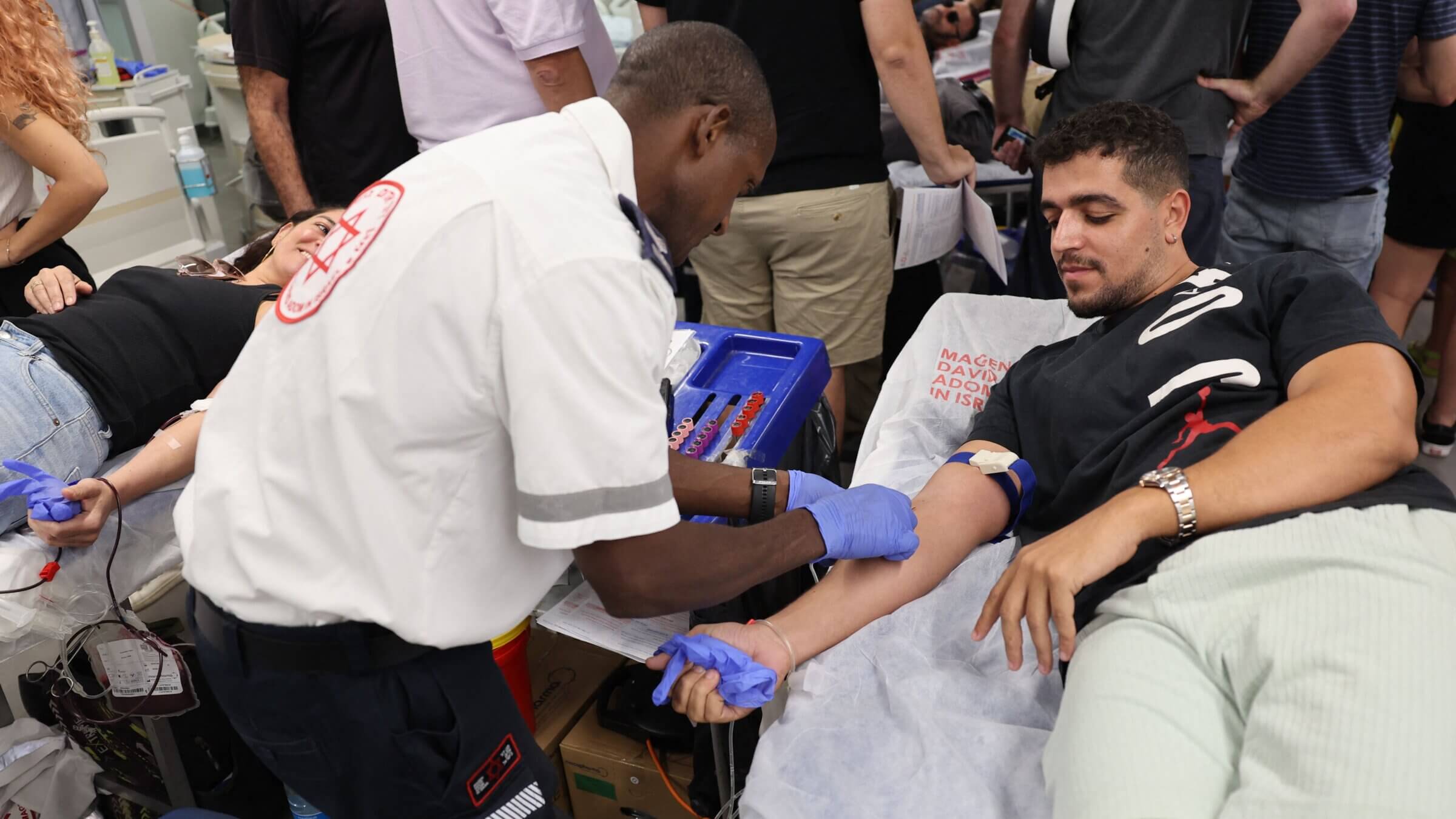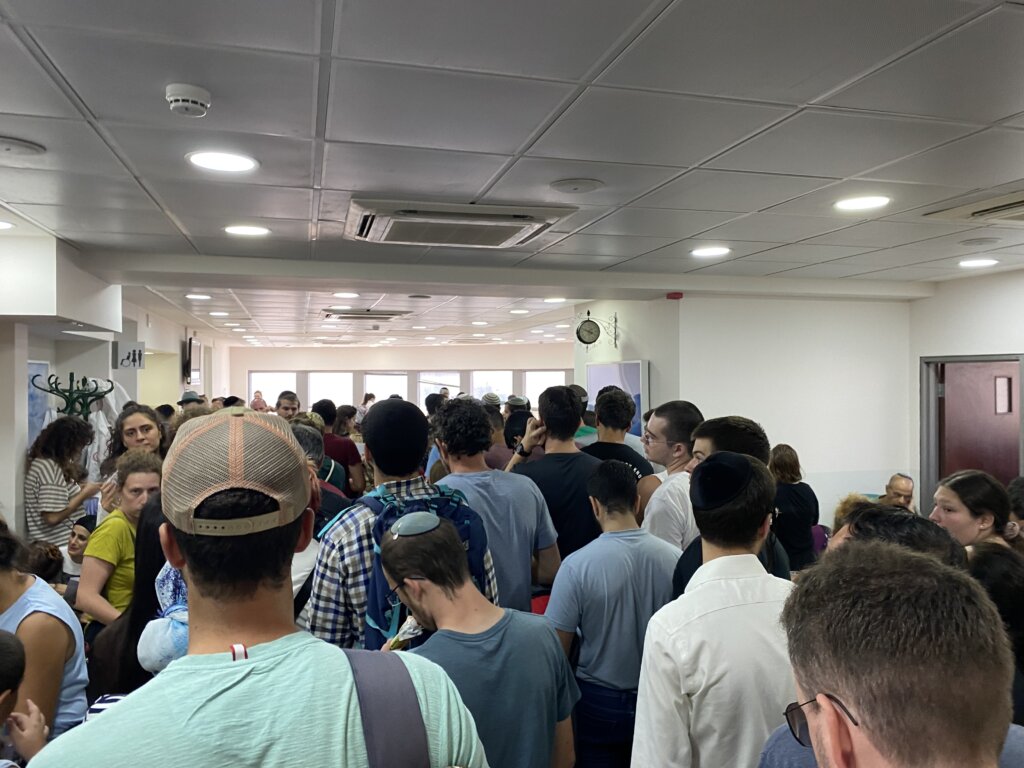As a new immigrant to Israel, all I can give is my blood
I wish my blood could be enough to save Israel, to revive those murdered. But nothing I do can bring those innocent souls back.

Israelis donate blood at a hospital in Tel Aviv on Oct. 7, 2023, after a barrage of rockets were fired and terrorists from the Gaza Strip infiltrated Israel. Photo by Jack Guez/AFP via Getty Images
JERUSALEM —My home is under attack. It’s the only thought inhabiting my mind on the Magen David Adom donor couch as a thin tube of blood flows from my arm into the collection monitor beside me.
I moved to Israel not even two months ago. Now, I am sprawled on a table, among a cacophony of Israeli medics and blood donors, seeking to aid Israel’s war efforts after Hamas’ invasion and massacre. As a new immigrant, my blood is all I can offer my country.
Shmuel, the medic beside me, eyes the monitor. His black curls sit lifelessly above his sullen expression. I wonder where his loved ones are right now. How many were called for reservist duty? Are his brothers and sisters en route to confront Hamas down south?
I saw photographs this morning of bloodied corpses strewn across Sderot streets, children lying face-down beside their parents. Does Shmuel have friends from Sderot? Though the room is loud, a chasm of silence sits between us.

“When did you arrive today?” I ask him in my unpolished Hebrew. It’s my feeble attempt to bridge us together — I the Israeli immigrant, he the Israeli native.
“6:30 in the morning.” I glance at my watch: It’s 3:37 p.m. I recall my exasperation waiting in the hospital over the last four hours between crowded frenzies in tight hallways. Shmuel had been on duty for nearly five hours when I first arrived, yet I grew frustrated by merely standing in line. I silently swallowed my shame.
I wonder how we got here — not myself and Shmuel, but Israel and the Jewish people. Hundreds of soldiers and civilians dead, thousands wounded, over a hundred abducted. Hamas breached Israel hardly 40 hours prior. My home is under attack.
Since Shabbat and Simchat Torah ended Saturday night, I’ve scoured news sites and social media for any information, any sense of understanding I could find. But none of this makes sense.
I’ve fantasized about turning back time before the fateful Shabbat morning in Southern Israel, knowing this attack awaited so I could alert the government, so I could prevent the carnage. I despise my utter helplessness.
“Do you have friends in reserve?” I ask. I hope Shmuel will accept my outstretched hand.
That catches his attention. “Betach” — of course — he shoots back. It comes like a subtle rebuke to my naïve question: All Israelis have friends in reserve; war is always personal. “My sister, my wife’s brother — I have four friends, one near Gaza.” Our conversation is entirely in Hebrew, hardly my second language, but his fast Israeli tone is well beyond my comprehension skills. I nod silently as a gesture of solidarity.
I never served in the Israeli army — I’m not even officially a citizen yet. After Shabbat, when I discovered the extent of this crisis, I frantically messaged my Israeli rabbis and friends to check in. Some were called for reservist duty; many had family members — sons, nephews, cousins — already stationed at their bases. I feel guilty even asking them, as if I was inserting myself into a narrative I am so disconnected from. My home is under attack, I think to myself, but I feel so unworthy to call it “my home.”
And even this guilt feels undeserved.
The bloodshed is unfathomable. After Shabbat, 100 people were dead. Then 150. Then 250. Then over 300. Then over 600. Now over 700, with “several hundred more” anticipated. Every video I saw of trembling children crouched against their parents is seared into my mind. Every contorted face crying for help is etched into my memory. This damage cannot be undone.
This all runs through my head when I look at Shmuel.
I wish my blood could be enough to save Israel, to revive those murdered. But nothing I do can bring those innocent souls back. Nothing any of us do can rewind time. My heart aches in misery. It throbs with the Jewish people. We are all in pain. We are all in peril. Our home is under attack.
I look into Shmuel’s fixed eyes and see his sorrow. “They are in my prayers,” I say. My voice cracks. We sit beside each other but worlds apart. I will never understand the depths of his anguish, but I insist on trying. This is our nation’s pain.
Shmuel’s lips fold in acknowledgment. “Thank you.”

















